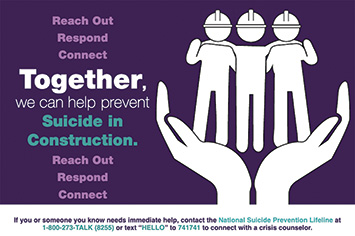By NICHOLAS WYMAN
 We think we know a lot about construction workers. The stereotype typically is that they’re strong, no-nonsense people who enjoy physical work. Many are athletic, likely to have played high school sports. And many are armed forces veterans. This kind of background fosters great traits. Construction workers are often agile, strong, physically resilient, good at teamwork, comfortable playing by rules and happy to follow a chain of command.
We think we know a lot about construction workers. The stereotype typically is that they’re strong, no-nonsense people who enjoy physical work. Many are athletic, likely to have played high school sports. And many are armed forces veterans. This kind of background fosters great traits. Construction workers are often agile, strong, physically resilient, good at teamwork, comfortable playing by rules and happy to follow a chain of command.
But there are downsides as well. Dr. John Gaal, newly appointed Worker Wellness Director at Missouri AFL-CIO’s “Missouri Works Initiative (MWI)” shared his insights on those downsides.
He told me that athletes and veterans may be tough on the outside, but can also be struggling with the effects of undiagnosed injuries. Chief among these is traumatic brain injury (TBI), caused by repetitive, low-level head trauma over time.
TBI can disrupt the brain’s normal functioning, change mental state temporarily, and spawn other negative outcomes such as headaches; motor dysfunction; and sensory, cognitive, and speech issues. Mental health problems related to TBI can take many forms, such as anxiety, depression, and, with veterans, post-traumatic
HIS PERSONAL EXPERIENCE
Sadly, Gaal has personal experience with TBI. A few years ago, his 24-year-old son died by suicide after a period of unexplained personality changes and depression. Posthumously, his son was diagnosed with chronic traumatic encephalopathy (CTE) brought on by years of head knocks playing soccer and football. Gaal knows firsthand how subtle the symptoms can be, and how difficult it is for sufferers to get the help they need.
Americans incur up to 3.8 million traumatic brain injuries each year. And if sportsmen and vets with undiagnosed brain trauma enter the construction industry, they’re likely to experience additional injury on the job.
The Centers for Disease Control (CDC) says more head injuries happen in the construction sector than in any other sector.
NEGATIVE COPING STRATEGIES
Dealing with that kind of pain and trauma in an industry where toughness is mandatory can result in some very negative coping strategies.
Research shows blue-collar workers, particularly those in construction, are more likely to smoke, and to be moderate-to-heavy smokers. Blue-collar employees also have a higher risk of alcohol and drug use. Construction workers in particular are the most likely of any occupation to use drugs, including opioids. And shockingly, the construction industry has the second-highest rate of suicides by occupation.
These problems don’t just affect older workers. The negative behaviors mixed with a macho work culture affect new workers as well.
APPRENTICES STUDIES
Gaal did a pilot study of 49 construction industry apprentices and found more than one-third said they were often stressed by mistreatment within the program. About the same number said they had anxiety about unsafe job site conditions. They did not report their work issues to peers or supervisors, however, but confided in family or community members. These findings indicate that a significant number of young workers in the construction industry are experiencing unreported trauma and stress.
Something needs to change in the industry. Workers and apprentices need to know they can safely confront mental health issues without stigma or retribution. Many construction companies do have a strong focus on physical health and workplace safety. But they often remain silent on mental health issues.
HOW TO HELP
Gaal says construction companies should consider:
- An open-door policy with the human resources team to discuss how workplace stress can be reduced.
- Keeping current on the latest evidence about work-life balance, wellness, and wellbeing.
- Sharing self-care information about stress-management techniques including diet, exercise, mindfulness, avoiding at-risk behavior, the need for proper rest, cultivating prosocial behaviors, developing financial literacy and learning about alternative pain management strategies.
- Tapping into resilience training through phone apps workers can access when they’re most in need.
- Breaking the silence by talking about mental health, including the opioid and suicide crisis in the construction industry.
- Checking out these excellent websites from the U.S., UK, and Australia, which aim to debunk the hyper-masculine construction worker image for a more pragmatic one that’s kinder on mental health: Mates, Mates In Mind, Prevent Construction Suicide, Living Works, Man Therapy and the AGCMO’s Suicide Prevention’s page.


